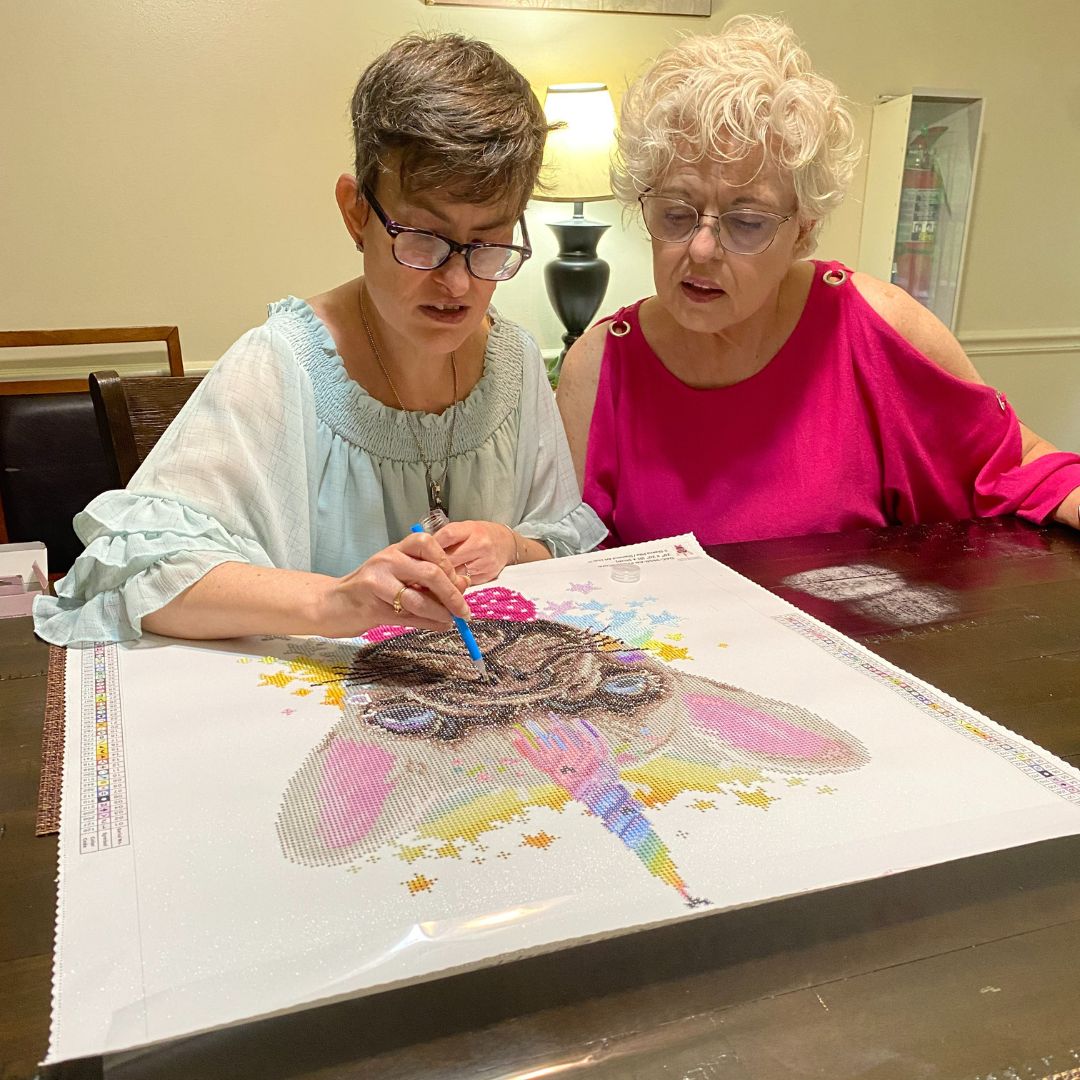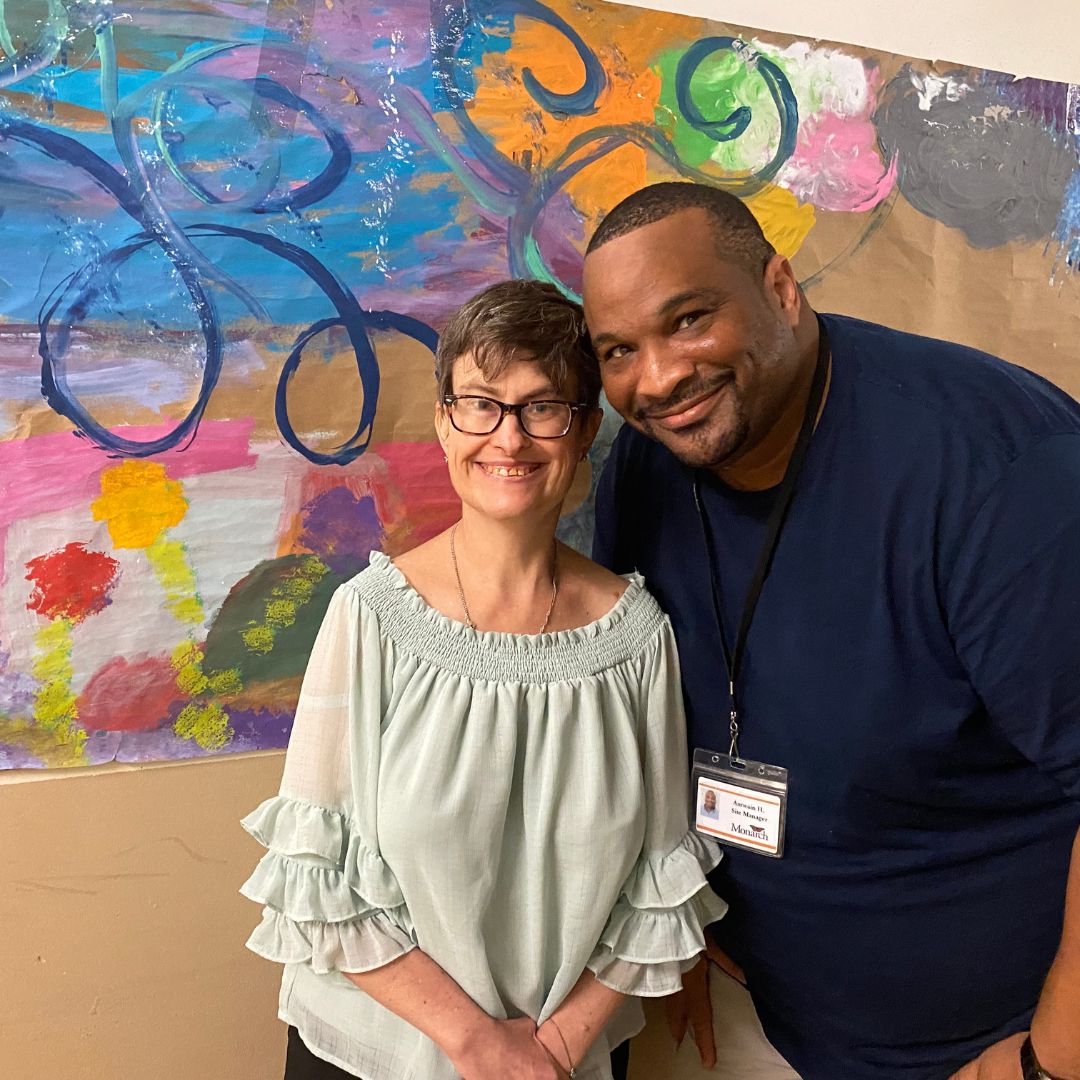Advocate Mom’s Efforts Rewarded in Thriving Daughter

Beth Townsend, a resident at Monarch’s Lafayette Group Home in Albemarle, works on a diamond art project with her mom, Penny, admiring her work.
Penny Townsend sees her parental role as a passionate advocate seeking the best life experiences for her children.
Her daughter, Angela Elizabeth “Beth” Townsend, was diagnosed with Prader-Willi Syndrome (PWS), a rare genetic disorder that results in physical, mental and behavioral struggles. The diagnosis is most commonly noted by an unsatisfied hunger that can cause obesity if not strictly monitored. An estimated 10,000 to 20,000 individuals are living with the genetic disorder in the U.S., affecting both males and females, all races and ethnicities.
Penny’s tenacity and advocacy efforts for her daughter, from infancy to adulthood, have helped Beth, who is a resident at Monarch’s Lafayette Drive Group Home in Albemarle, live an independent and fulfilling life.
Early Advocacy
Penny began advocating for her daughter as soon as she was born starting in the neo-natal nursery at Duke Raleigh Hospital in 1975. As Beth entered her toddler years, doctors labeled the young child as intellectually and developmentally disabled. Instead of learning to crawl, Beth moved around similar to an inch worm, Penny explains. She received specialized medical and behavioral care, as well as physical and speech therapy.
However, Beth searched for food wherever she could find it – the family’s kitchen garbage can, the dog’s dish. Penny knew something else was wrong but doctors could not provide an answer.
She researched in local libraries and at area universities. When Beth was 8 years old, Penny found information on PWS. She brought what she found to Beth’s endocrinologist at Chapel Hill. He confirmed her findings and predicted that Beth would most likely not live past her teen years.
Penny began the “uphill battle” for her daughter to ensure education and services and to better understand the PWS diagnosis. “I am a mild mannered woman but when it comes to my child I am not quiet,” the mom says of her parenting style to her now 47-year-old daughter. “It is worth it. She is a beautiful young lady.”
Elementary school years were difficult with teasing from other children and difficulties with teachers not understanding how to handle Beth’s behaviors. She graduated from North Stanly High School with a diploma after a lot of hard work, Penny shares: “We were all so proud of her.”
Pursuing Independence
Today, Beth is a resident of Monarch’s Lafayette Drive Group Home, the first group home established in North Carolina for people diagnosed with PWS. The brown brick ranch is home to six adults with PWS and sits off the road on a wooded residential street in Albemarle.
In 1995, after many conversations with Monarch and The Arc of Stanly County, the home was planned and ultimately constructed. Penny recalls that when the home was being built neighbors didn’t want it on their street. They didn’t understand the concept of supported, independent living that a group home environment could offer. And, they didn’t understand PWS.
When Lafayette group home residents take walks, neighbors now wave and know each other by name. Penny said they apologized for the push back early on.
Beth’s room at the group home is personalized and filled with her artwork and many diamond art creations. To learn more about her community, she completed Leadership Stanly in 2002. She attends Monarch’s Stanly Industrial Services (SIS) adult day program where she is involved in activities with her peers. She enjoys exercising at the local YMCA, learning yoga and swimming.
“I like to have my own space and having my own place and I don’t have to live at home, and do things myself. I like to do diamond art and crossword puzzles and different things like that,” Beth shares, noting that she is proud of being the first Lafayette Drive Group Home resident.
Advice to Other Parent Advocates

Beth Townsend enjoys her time at Monarch’s Stanly Industrial Services day program with Site Manager Antwain Hamilton.
Penny and Beth are grateful for the collaborative effort of Lafayette Residential Manager Diane Bowden and the group home staff; SIS Site Manager Antwain Hamilton; and Medical Director Robert McHale, M.D., M.Sc., DFAPA, ABPM, FASAM, for the CCBHC and Long-Term Services and Supports. Penny believes that the collaborative effort of family and Monarch staff have helped her daughter mature into the woman she is today.
“Beth is really helpful with staff. She knows when she needs to walk away and re-direct,” Antwain says of Beth, who he considers a long-time friend with both of their families growing up in Albemarle and attending school together. “I couldn’t be more proud of her. She is learning to handle issues in her way.”
Residential Manager Diane Bowden is impressed with Beth’s efforts to be involved in her community and the relationships she has made. “She is connected with a lot of people in the community and that is amazing,” she remarks.
What is Penny’s advice to parents advocating for their children? She strongly suggests to research and get involved in any national agencies associated with your child’s diagnosis. “Go to libraries and get all the information that you can get a hold of and research, research, research,” Penny says, noting that others thought specialized services like physical therapy and speech therapy wouldn’t benefit her daughter. “Do whatever you can in regard to therapy – whatever you think will help your child.”
Beth agrees that she is proud of the growth she has made. “Monarch has been a wonderful place. I have changed a lot and matured a lot,” she says.
Would you like information about Monarch’s residential options for people with intellectual and developmental disabilities and/or mental illness?
For more information about Monarch’s residential long-term services and supports throughout North Carolina or to view current residential vacancies for people with intellectual and developmental disabilities and/or mental illness, please visit here.
Posted on: Tuesday October 25, 2022
